Business Ethics and Values: A Case Study of Tasmanian Bread Mills
VerifiedAdded on 2023/06/12
|7
|2312
|62
Report
AI Summary
This report delves into the ethical dilemma faced by Robert, the HR Manager at Tasmanian Bread Mills, concerning the potential closure of the northern mill and its impact on the local community. The report explores the morally right course of action from Robert's perspective, emphasizing the importance of voicing the concerns of the community and advocating for their welfare despite potential repercussions. It identifies key moral norms such as beneficence and governance, and discusses how these values can be enacted within the given circumstances. Furthermore, the report considers the emotional, cognitive, cultural, political, and institutional factors that could enable or disable Robert's ability to effectively communicate his moral values and influence the decision-making process, ultimately highlighting the complex interplay between personal ethics, organizational responsibilities, and community interests. Desklib is a platform where students can find similar solved assignments and resources.
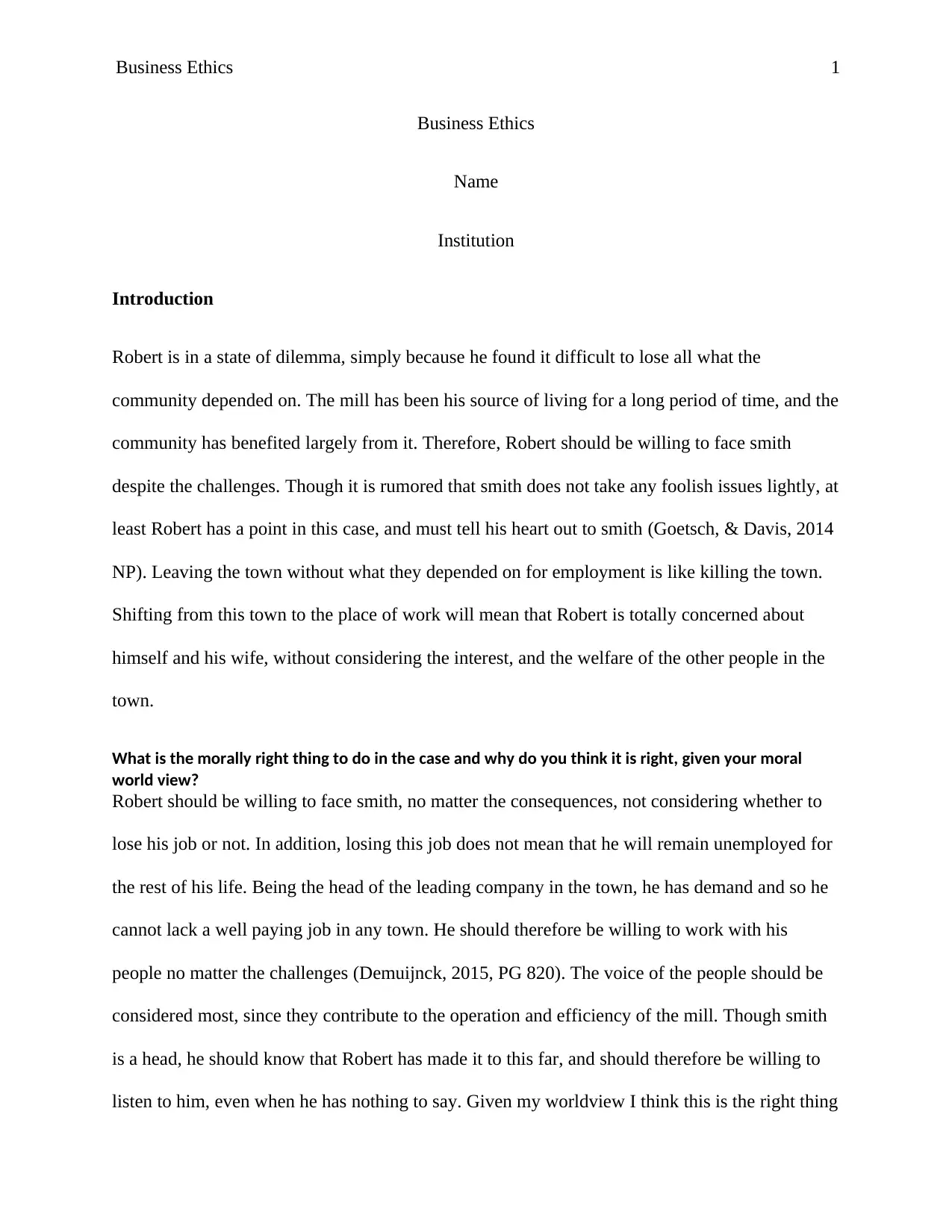
Business Ethics 1
Business Ethics
Name
Institution
Introduction
Robert is in a state of dilemma, simply because he found it difficult to lose all what the
community depended on. The mill has been his source of living for a long period of time, and the
community has benefited largely from it. Therefore, Robert should be willing to face smith
despite the challenges. Though it is rumored that smith does not take any foolish issues lightly, at
least Robert has a point in this case, and must tell his heart out to smith (Goetsch, & Davis, 2014
NP). Leaving the town without what they depended on for employment is like killing the town.
Shifting from this town to the place of work will mean that Robert is totally concerned about
himself and his wife, without considering the interest, and the welfare of the other people in the
town.
What is the morally right thing to do in the case and why do you think it is right, given your moral
world view?
Robert should be willing to face smith, no matter the consequences, not considering whether to
lose his job or not. In addition, losing this job does not mean that he will remain unemployed for
the rest of his life. Being the head of the leading company in the town, he has demand and so he
cannot lack a well paying job in any town. He should therefore be willing to work with his
people no matter the challenges (Demuijnck, 2015, PG 820). The voice of the people should be
considered most, since they contribute to the operation and efficiency of the mill. Though smith
is a head, he should know that Robert has made it to this far, and should therefore be willing to
listen to him, even when he has nothing to say. Given my worldview I think this is the right thing
Business Ethics
Name
Institution
Introduction
Robert is in a state of dilemma, simply because he found it difficult to lose all what the
community depended on. The mill has been his source of living for a long period of time, and the
community has benefited largely from it. Therefore, Robert should be willing to face smith
despite the challenges. Though it is rumored that smith does not take any foolish issues lightly, at
least Robert has a point in this case, and must tell his heart out to smith (Goetsch, & Davis, 2014
NP). Leaving the town without what they depended on for employment is like killing the town.
Shifting from this town to the place of work will mean that Robert is totally concerned about
himself and his wife, without considering the interest, and the welfare of the other people in the
town.
What is the morally right thing to do in the case and why do you think it is right, given your moral
world view?
Robert should be willing to face smith, no matter the consequences, not considering whether to
lose his job or not. In addition, losing this job does not mean that he will remain unemployed for
the rest of his life. Being the head of the leading company in the town, he has demand and so he
cannot lack a well paying job in any town. He should therefore be willing to work with his
people no matter the challenges (Demuijnck, 2015, PG 820). The voice of the people should be
considered most, since they contribute to the operation and efficiency of the mill. Though smith
is a head, he should know that Robert has made it to this far, and should therefore be willing to
listen to him, even when he has nothing to say. Given my worldview I think this is the right thing
Paraphrase This Document
Need a fresh take? Get an instant paraphrase of this document with our AI Paraphraser
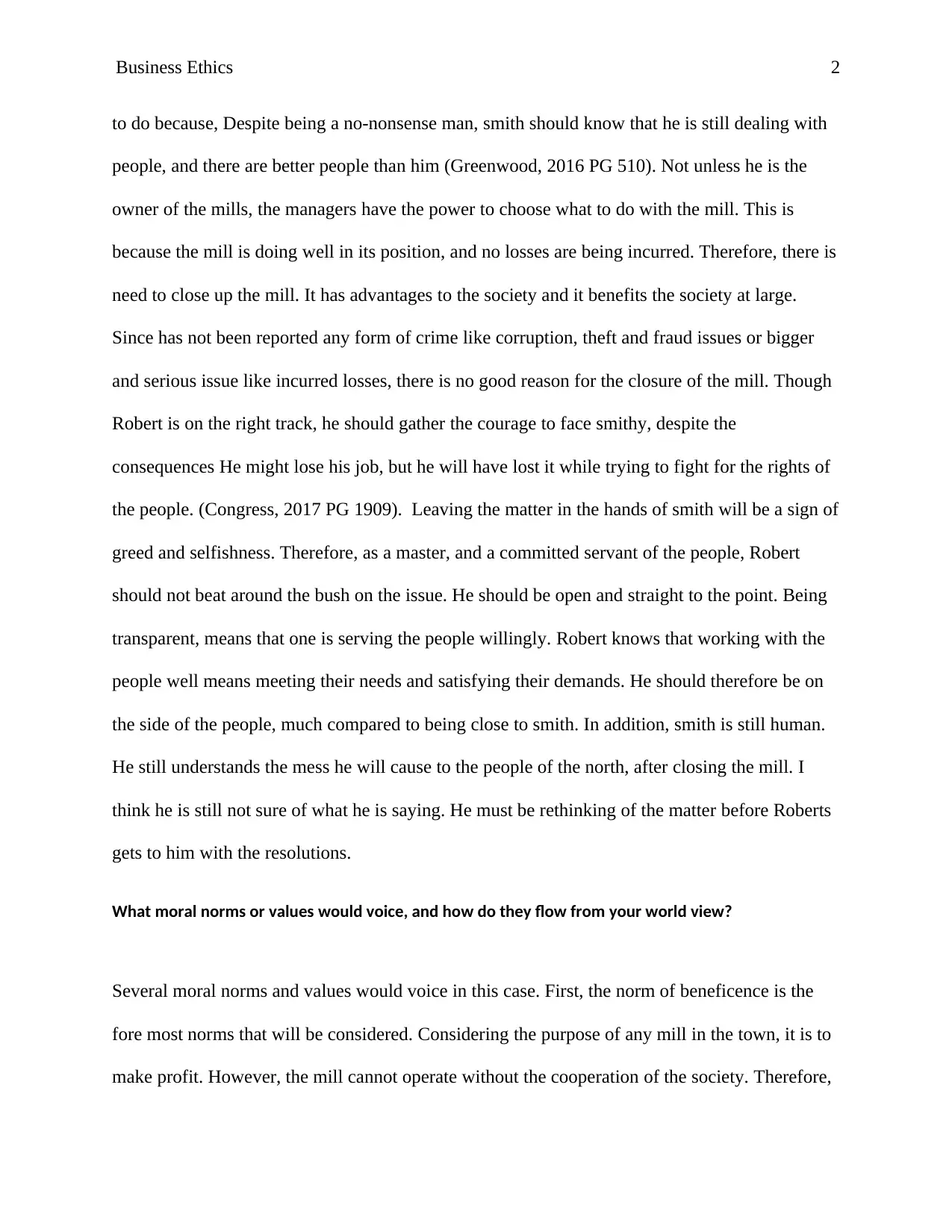
Business Ethics 2
to do because, Despite being a no-nonsense man, smith should know that he is still dealing with
people, and there are better people than him (Greenwood, 2016 PG 510). Not unless he is the
owner of the mills, the managers have the power to choose what to do with the mill. This is
because the mill is doing well in its position, and no losses are being incurred. Therefore, there is
need to close up the mill. It has advantages to the society and it benefits the society at large.
Since has not been reported any form of crime like corruption, theft and fraud issues or bigger
and serious issue like incurred losses, there is no good reason for the closure of the mill. Though
Robert is on the right track, he should gather the courage to face smithy, despite the
consequences He might lose his job, but he will have lost it while trying to fight for the rights of
the people. (Congress, 2017 PG 1909). Leaving the matter in the hands of smith will be a sign of
greed and selfishness. Therefore, as a master, and a committed servant of the people, Robert
should not beat around the bush on the issue. He should be open and straight to the point. Being
transparent, means that one is serving the people willingly. Robert knows that working with the
people well means meeting their needs and satisfying their demands. He should therefore be on
the side of the people, much compared to being close to smith. In addition, smith is still human.
He still understands the mess he will cause to the people of the north, after closing the mill. I
think he is still not sure of what he is saying. He must be rethinking of the matter before Roberts
gets to him with the resolutions.
What moral norms or values would voice, and how do they flow from your world view?
Several moral norms and values would voice in this case. First, the norm of beneficence is the
fore most norms that will be considered. Considering the purpose of any mill in the town, it is to
make profit. However, the mill cannot operate without the cooperation of the society. Therefore,
to do because, Despite being a no-nonsense man, smith should know that he is still dealing with
people, and there are better people than him (Greenwood, 2016 PG 510). Not unless he is the
owner of the mills, the managers have the power to choose what to do with the mill. This is
because the mill is doing well in its position, and no losses are being incurred. Therefore, there is
need to close up the mill. It has advantages to the society and it benefits the society at large.
Since has not been reported any form of crime like corruption, theft and fraud issues or bigger
and serious issue like incurred losses, there is no good reason for the closure of the mill. Though
Robert is on the right track, he should gather the courage to face smithy, despite the
consequences He might lose his job, but he will have lost it while trying to fight for the rights of
the people. (Congress, 2017 PG 1909). Leaving the matter in the hands of smith will be a sign of
greed and selfishness. Therefore, as a master, and a committed servant of the people, Robert
should not beat around the bush on the issue. He should be open and straight to the point. Being
transparent, means that one is serving the people willingly. Robert knows that working with the
people well means meeting their needs and satisfying their demands. He should therefore be on
the side of the people, much compared to being close to smith. In addition, smith is still human.
He still understands the mess he will cause to the people of the north, after closing the mill. I
think he is still not sure of what he is saying. He must be rethinking of the matter before Roberts
gets to him with the resolutions.
What moral norms or values would voice, and how do they flow from your world view?
Several moral norms and values would voice in this case. First, the norm of beneficence is the
fore most norms that will be considered. Considering the purpose of any mill in the town, it is to
make profit. However, the mill cannot operate without the cooperation of the society. Therefore,
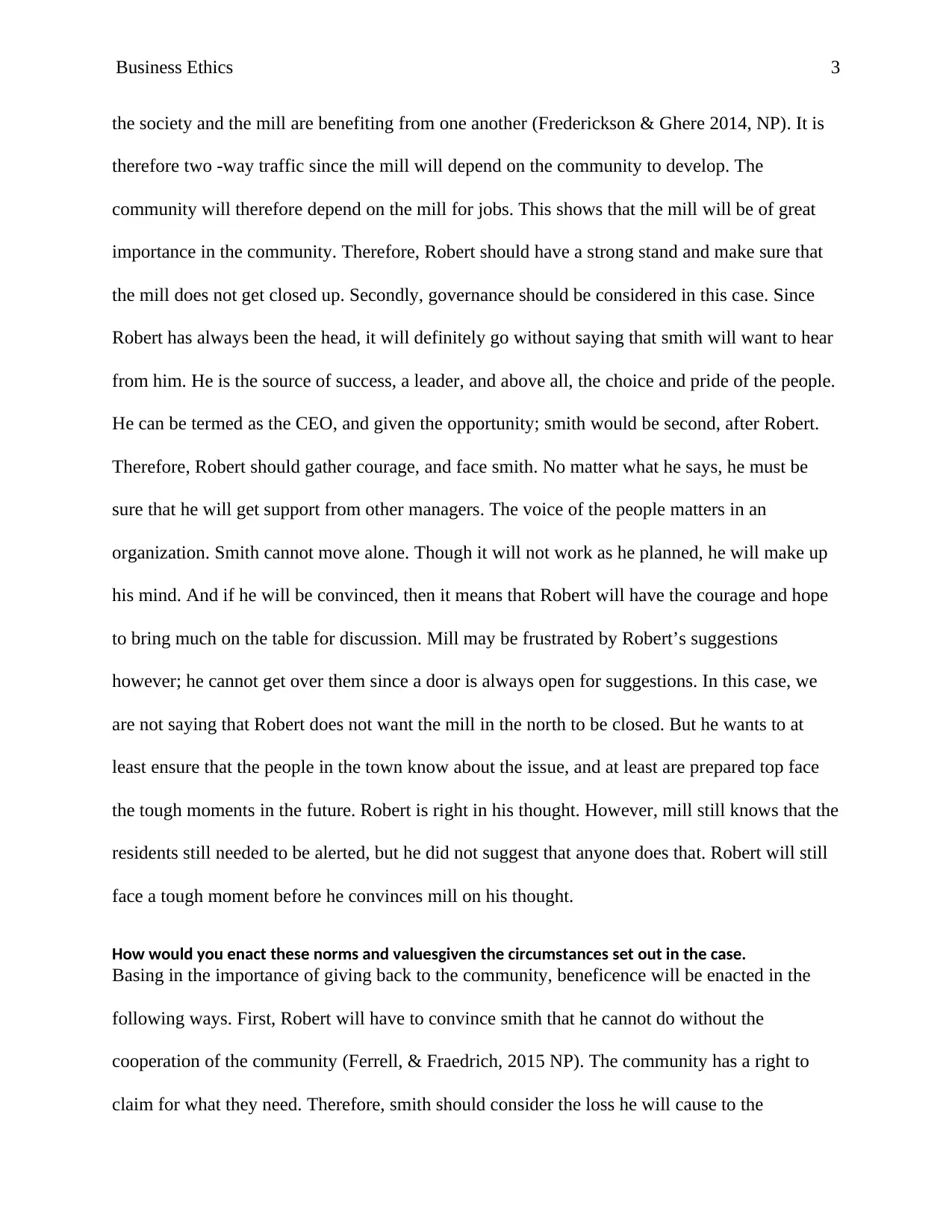
Business Ethics 3
the society and the mill are benefiting from one another (Frederickson & Ghere 2014, NP). It is
therefore two -way traffic since the mill will depend on the community to develop. The
community will therefore depend on the mill for jobs. This shows that the mill will be of great
importance in the community. Therefore, Robert should have a strong stand and make sure that
the mill does not get closed up. Secondly, governance should be considered in this case. Since
Robert has always been the head, it will definitely go without saying that smith will want to hear
from him. He is the source of success, a leader, and above all, the choice and pride of the people.
He can be termed as the CEO, and given the opportunity; smith would be second, after Robert.
Therefore, Robert should gather courage, and face smith. No matter what he says, he must be
sure that he will get support from other managers. The voice of the people matters in an
organization. Smith cannot move alone. Though it will not work as he planned, he will make up
his mind. And if he will be convinced, then it means that Robert will have the courage and hope
to bring much on the table for discussion. Mill may be frustrated by Robert’s suggestions
however; he cannot get over them since a door is always open for suggestions. In this case, we
are not saying that Robert does not want the mill in the north to be closed. But he wants to at
least ensure that the people in the town know about the issue, and at least are prepared top face
the tough moments in the future. Robert is right in his thought. However, mill still knows that the
residents still needed to be alerted, but he did not suggest that anyone does that. Robert will still
face a tough moment before he convinces mill on his thought.
How would you enact these norms and valuesgiven the circumstances set out in the case.
Basing in the importance of giving back to the community, beneficence will be enacted in the
following ways. First, Robert will have to convince smith that he cannot do without the
cooperation of the community (Ferrell, & Fraedrich, 2015 NP). The community has a right to
claim for what they need. Therefore, smith should consider the loss he will cause to the
the society and the mill are benefiting from one another (Frederickson & Ghere 2014, NP). It is
therefore two -way traffic since the mill will depend on the community to develop. The
community will therefore depend on the mill for jobs. This shows that the mill will be of great
importance in the community. Therefore, Robert should have a strong stand and make sure that
the mill does not get closed up. Secondly, governance should be considered in this case. Since
Robert has always been the head, it will definitely go without saying that smith will want to hear
from him. He is the source of success, a leader, and above all, the choice and pride of the people.
He can be termed as the CEO, and given the opportunity; smith would be second, after Robert.
Therefore, Robert should gather courage, and face smith. No matter what he says, he must be
sure that he will get support from other managers. The voice of the people matters in an
organization. Smith cannot move alone. Though it will not work as he planned, he will make up
his mind. And if he will be convinced, then it means that Robert will have the courage and hope
to bring much on the table for discussion. Mill may be frustrated by Robert’s suggestions
however; he cannot get over them since a door is always open for suggestions. In this case, we
are not saying that Robert does not want the mill in the north to be closed. But he wants to at
least ensure that the people in the town know about the issue, and at least are prepared top face
the tough moments in the future. Robert is right in his thought. However, mill still knows that the
residents still needed to be alerted, but he did not suggest that anyone does that. Robert will still
face a tough moment before he convinces mill on his thought.
How would you enact these norms and valuesgiven the circumstances set out in the case.
Basing in the importance of giving back to the community, beneficence will be enacted in the
following ways. First, Robert will have to convince smith that he cannot do without the
cooperation of the community (Ferrell, & Fraedrich, 2015 NP). The community has a right to
claim for what they need. Therefore, smith should consider the loss he will cause to the
⊘ This is a preview!⊘
Do you want full access?
Subscribe today to unlock all pages.

Trusted by 1+ million students worldwide
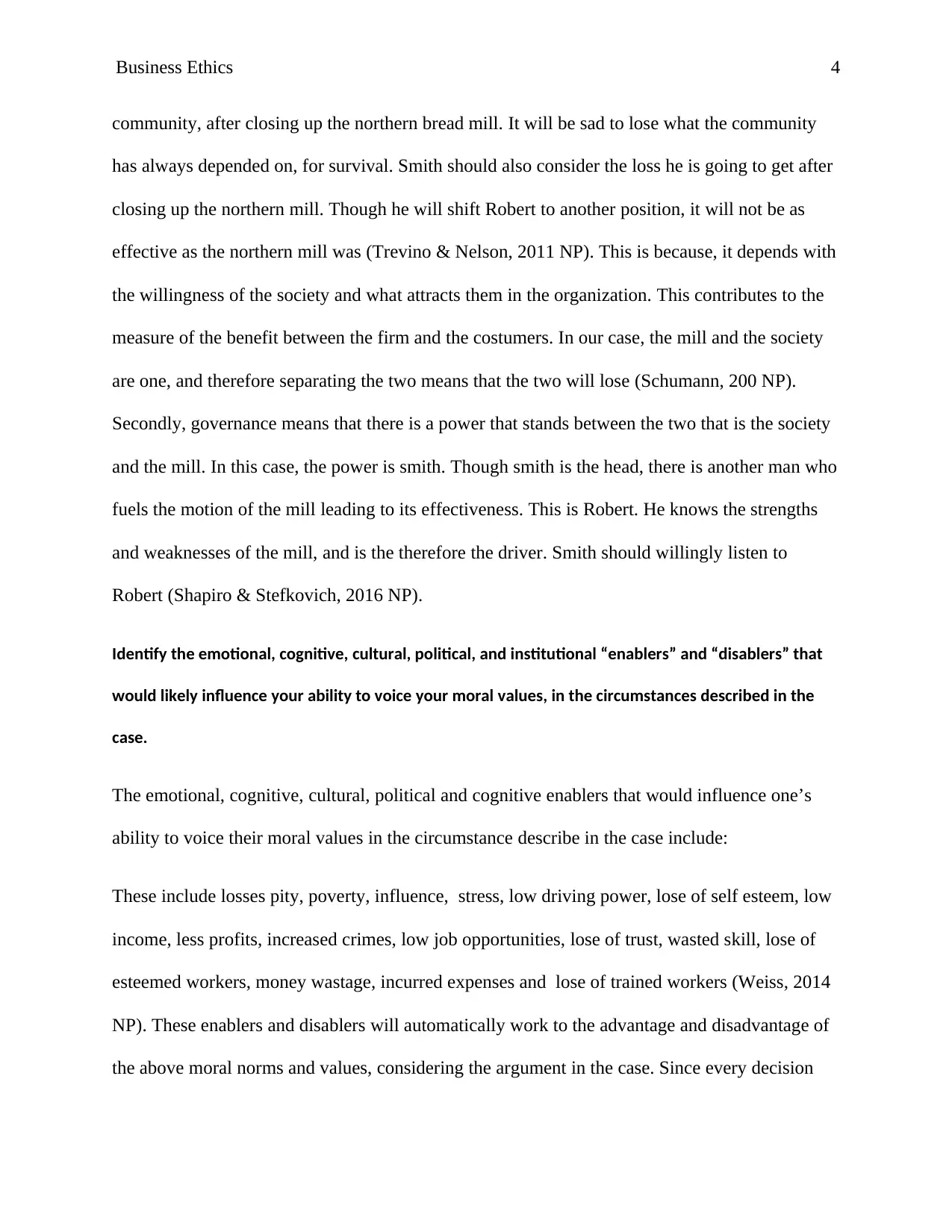
Business Ethics 4
community, after closing up the northern bread mill. It will be sad to lose what the community
has always depended on, for survival. Smith should also consider the loss he is going to get after
closing up the northern mill. Though he will shift Robert to another position, it will not be as
effective as the northern mill was (Trevino & Nelson, 2011 NP). This is because, it depends with
the willingness of the society and what attracts them in the organization. This contributes to the
measure of the benefit between the firm and the costumers. In our case, the mill and the society
are one, and therefore separating the two means that the two will lose (Schumann, 200 NP).
Secondly, governance means that there is a power that stands between the two that is the society
and the mill. In this case, the power is smith. Though smith is the head, there is another man who
fuels the motion of the mill leading to its effectiveness. This is Robert. He knows the strengths
and weaknesses of the mill, and is the therefore the driver. Smith should willingly listen to
Robert (Shapiro & Stefkovich, 2016 NP).
Identify the emotional, cognitive, cultural, political, and institutional “enablers” and “disablers” that
would likely influence your ability to voice your moral values, in the circumstances described in the
case.
The emotional, cognitive, cultural, political and cognitive enablers that would influence one’s
ability to voice their moral values in the circumstance describe in the case include:
These include losses pity, poverty, influence, stress, low driving power, lose of self esteem, low
income, less profits, increased crimes, low job opportunities, lose of trust, wasted skill, lose of
esteemed workers, money wastage, incurred expenses and lose of trained workers (Weiss, 2014
NP). These enablers and disablers will automatically work to the advantage and disadvantage of
the above moral norms and values, considering the argument in the case. Since every decision
community, after closing up the northern bread mill. It will be sad to lose what the community
has always depended on, for survival. Smith should also consider the loss he is going to get after
closing up the northern mill. Though he will shift Robert to another position, it will not be as
effective as the northern mill was (Trevino & Nelson, 2011 NP). This is because, it depends with
the willingness of the society and what attracts them in the organization. This contributes to the
measure of the benefit between the firm and the costumers. In our case, the mill and the society
are one, and therefore separating the two means that the two will lose (Schumann, 200 NP).
Secondly, governance means that there is a power that stands between the two that is the society
and the mill. In this case, the power is smith. Though smith is the head, there is another man who
fuels the motion of the mill leading to its effectiveness. This is Robert. He knows the strengths
and weaknesses of the mill, and is the therefore the driver. Smith should willingly listen to
Robert (Shapiro & Stefkovich, 2016 NP).
Identify the emotional, cognitive, cultural, political, and institutional “enablers” and “disablers” that
would likely influence your ability to voice your moral values, in the circumstances described in the
case.
The emotional, cognitive, cultural, political and cognitive enablers that would influence one’s
ability to voice their moral values in the circumstance describe in the case include:
These include losses pity, poverty, influence, stress, low driving power, lose of self esteem, low
income, less profits, increased crimes, low job opportunities, lose of trust, wasted skill, lose of
esteemed workers, money wastage, incurred expenses and lose of trained workers (Weiss, 2014
NP). These enablers and disablers will automatically work to the advantage and disadvantage of
the above moral norms and values, considering the argument in the case. Since every decision
Paraphrase This Document
Need a fresh take? Get an instant paraphrase of this document with our AI Paraphraser
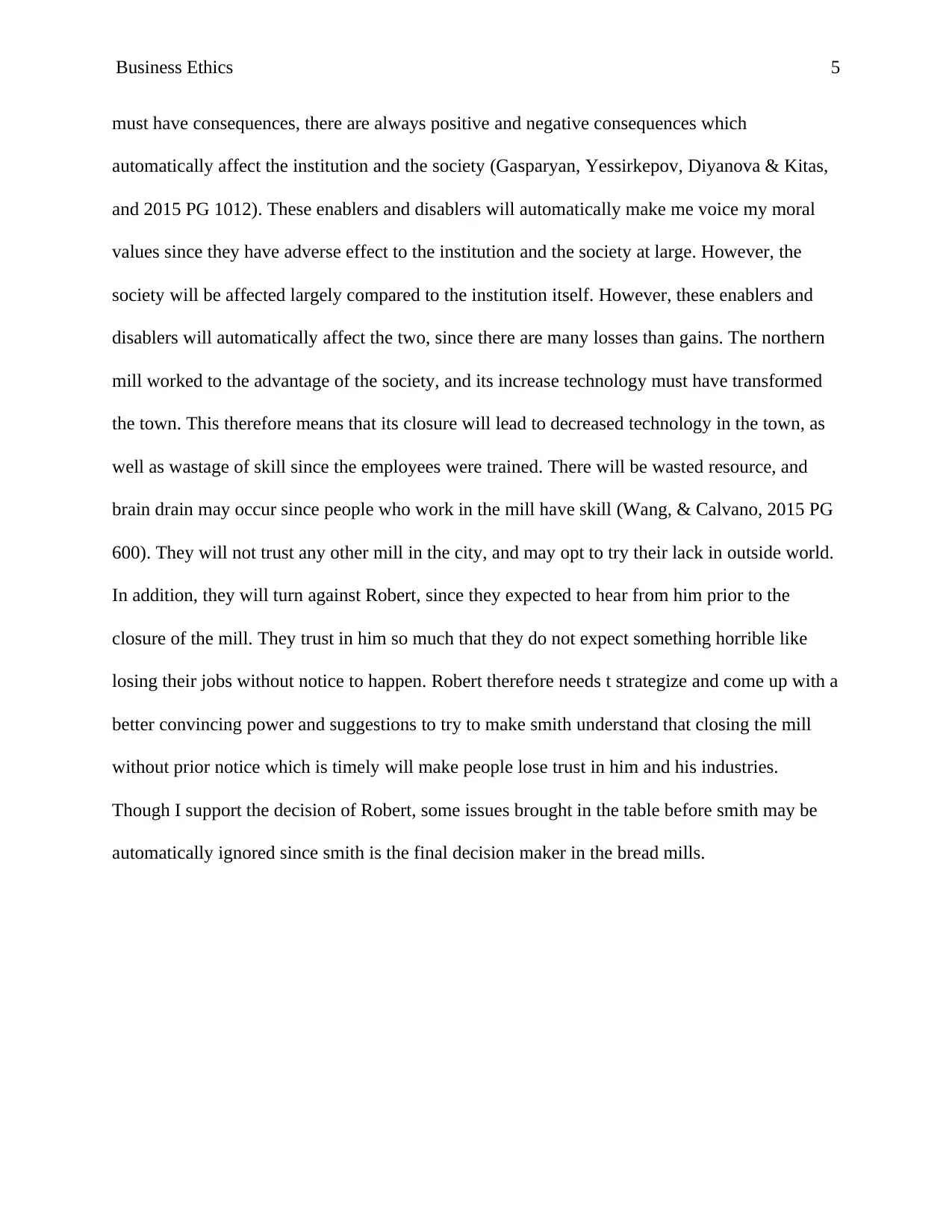
Business Ethics 5
must have consequences, there are always positive and negative consequences which
automatically affect the institution and the society (Gasparyan, Yessirkepov, Diyanova & Kitas,
and 2015 PG 1012). These enablers and disablers will automatically make me voice my moral
values since they have adverse effect to the institution and the society at large. However, the
society will be affected largely compared to the institution itself. However, these enablers and
disablers will automatically affect the two, since there are many losses than gains. The northern
mill worked to the advantage of the society, and its increase technology must have transformed
the town. This therefore means that its closure will lead to decreased technology in the town, as
well as wastage of skill since the employees were trained. There will be wasted resource, and
brain drain may occur since people who work in the mill have skill (Wang, & Calvano, 2015 PG
600). They will not trust any other mill in the city, and may opt to try their lack in outside world.
In addition, they will turn against Robert, since they expected to hear from him prior to the
closure of the mill. They trust in him so much that they do not expect something horrible like
losing their jobs without notice to happen. Robert therefore needs t strategize and come up with a
better convincing power and suggestions to try to make smith understand that closing the mill
without prior notice which is timely will make people lose trust in him and his industries.
Though I support the decision of Robert, some issues brought in the table before smith may be
automatically ignored since smith is the final decision maker in the bread mills.
must have consequences, there are always positive and negative consequences which
automatically affect the institution and the society (Gasparyan, Yessirkepov, Diyanova & Kitas,
and 2015 PG 1012). These enablers and disablers will automatically make me voice my moral
values since they have adverse effect to the institution and the society at large. However, the
society will be affected largely compared to the institution itself. However, these enablers and
disablers will automatically affect the two, since there are many losses than gains. The northern
mill worked to the advantage of the society, and its increase technology must have transformed
the town. This therefore means that its closure will lead to decreased technology in the town, as
well as wastage of skill since the employees were trained. There will be wasted resource, and
brain drain may occur since people who work in the mill have skill (Wang, & Calvano, 2015 PG
600). They will not trust any other mill in the city, and may opt to try their lack in outside world.
In addition, they will turn against Robert, since they expected to hear from him prior to the
closure of the mill. They trust in him so much that they do not expect something horrible like
losing their jobs without notice to happen. Robert therefore needs t strategize and come up with a
better convincing power and suggestions to try to make smith understand that closing the mill
without prior notice which is timely will make people lose trust in him and his industries.
Though I support the decision of Robert, some issues brought in the table before smith may be
automatically ignored since smith is the final decision maker in the bread mills.
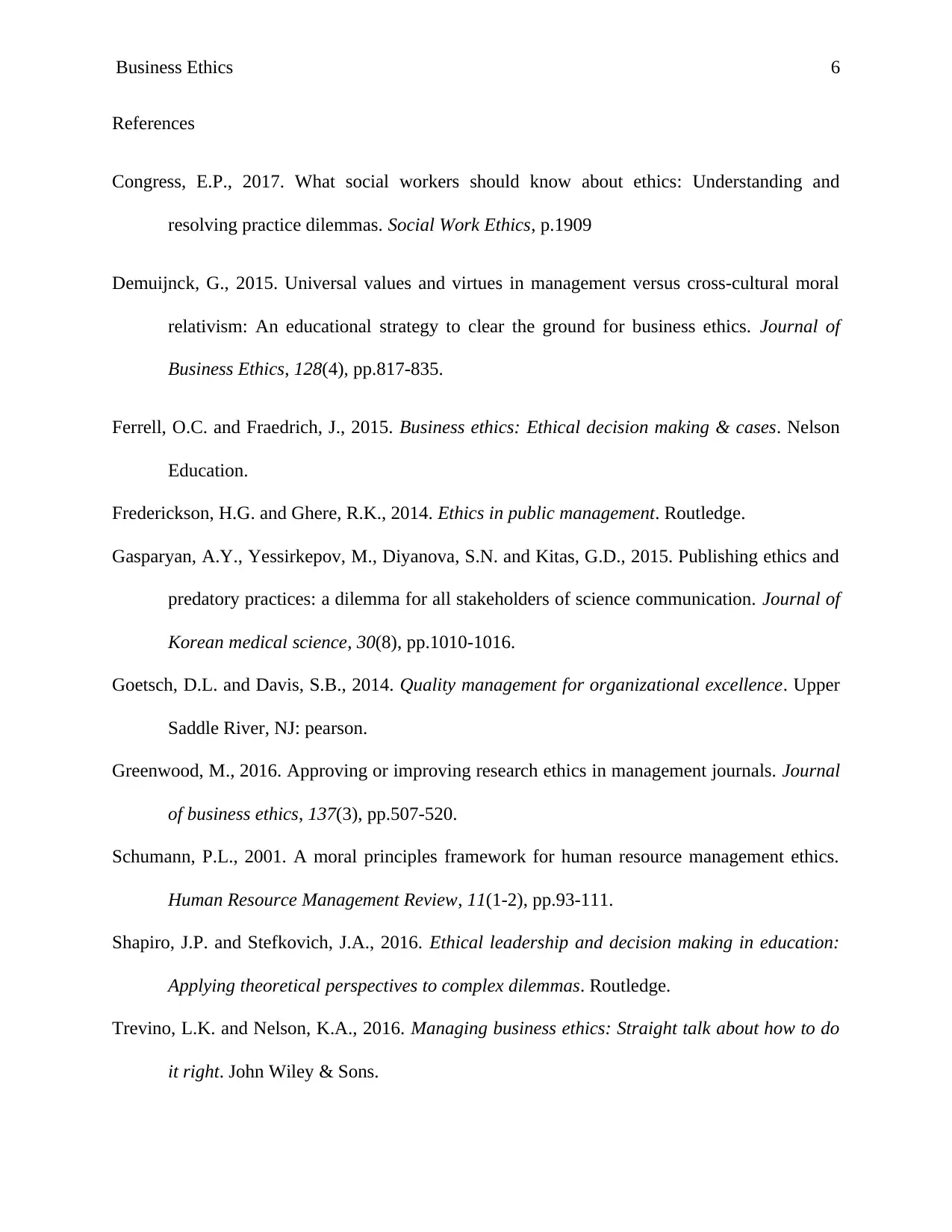
Business Ethics 6
References
Congress, E.P., 2017. What social workers should know about ethics: Understanding and
resolving practice dilemmas. Social Work Ethics, p.1909
Demuijnck, G., 2015. Universal values and virtues in management versus cross-cultural moral
relativism: An educational strategy to clear the ground for business ethics. Journal of
Business Ethics, 128(4), pp.817-835.
Ferrell, O.C. and Fraedrich, J., 2015. Business ethics: Ethical decision making & cases. Nelson
Education.
Frederickson, H.G. and Ghere, R.K., 2014. Ethics in public management. Routledge.
Gasparyan, A.Y., Yessirkepov, M., Diyanova, S.N. and Kitas, G.D., 2015. Publishing ethics and
predatory practices: a dilemma for all stakeholders of science communication. Journal of
Korean medical science, 30(8), pp.1010-1016.
Goetsch, D.L. and Davis, S.B., 2014. Quality management for organizational excellence. Upper
Saddle River, NJ: pearson.
Greenwood, M., 2016. Approving or improving research ethics in management journals. Journal
of business ethics, 137(3), pp.507-520.
Schumann, P.L., 2001. A moral principles framework for human resource management ethics.
Human Resource Management Review, 11(1-2), pp.93-111.
Shapiro, J.P. and Stefkovich, J.A., 2016. Ethical leadership and decision making in education:
Applying theoretical perspectives to complex dilemmas. Routledge.
Trevino, L.K. and Nelson, K.A., 2016. Managing business ethics: Straight talk about how to do
it right. John Wiley & Sons.
References
Congress, E.P., 2017. What social workers should know about ethics: Understanding and
resolving practice dilemmas. Social Work Ethics, p.1909
Demuijnck, G., 2015. Universal values and virtues in management versus cross-cultural moral
relativism: An educational strategy to clear the ground for business ethics. Journal of
Business Ethics, 128(4), pp.817-835.
Ferrell, O.C. and Fraedrich, J., 2015. Business ethics: Ethical decision making & cases. Nelson
Education.
Frederickson, H.G. and Ghere, R.K., 2014. Ethics in public management. Routledge.
Gasparyan, A.Y., Yessirkepov, M., Diyanova, S.N. and Kitas, G.D., 2015. Publishing ethics and
predatory practices: a dilemma for all stakeholders of science communication. Journal of
Korean medical science, 30(8), pp.1010-1016.
Goetsch, D.L. and Davis, S.B., 2014. Quality management for organizational excellence. Upper
Saddle River, NJ: pearson.
Greenwood, M., 2016. Approving or improving research ethics in management journals. Journal
of business ethics, 137(3), pp.507-520.
Schumann, P.L., 2001. A moral principles framework for human resource management ethics.
Human Resource Management Review, 11(1-2), pp.93-111.
Shapiro, J.P. and Stefkovich, J.A., 2016. Ethical leadership and decision making in education:
Applying theoretical perspectives to complex dilemmas. Routledge.
Trevino, L.K. and Nelson, K.A., 2016. Managing business ethics: Straight talk about how to do
it right. John Wiley & Sons.
⊘ This is a preview!⊘
Do you want full access?
Subscribe today to unlock all pages.

Trusted by 1+ million students worldwide
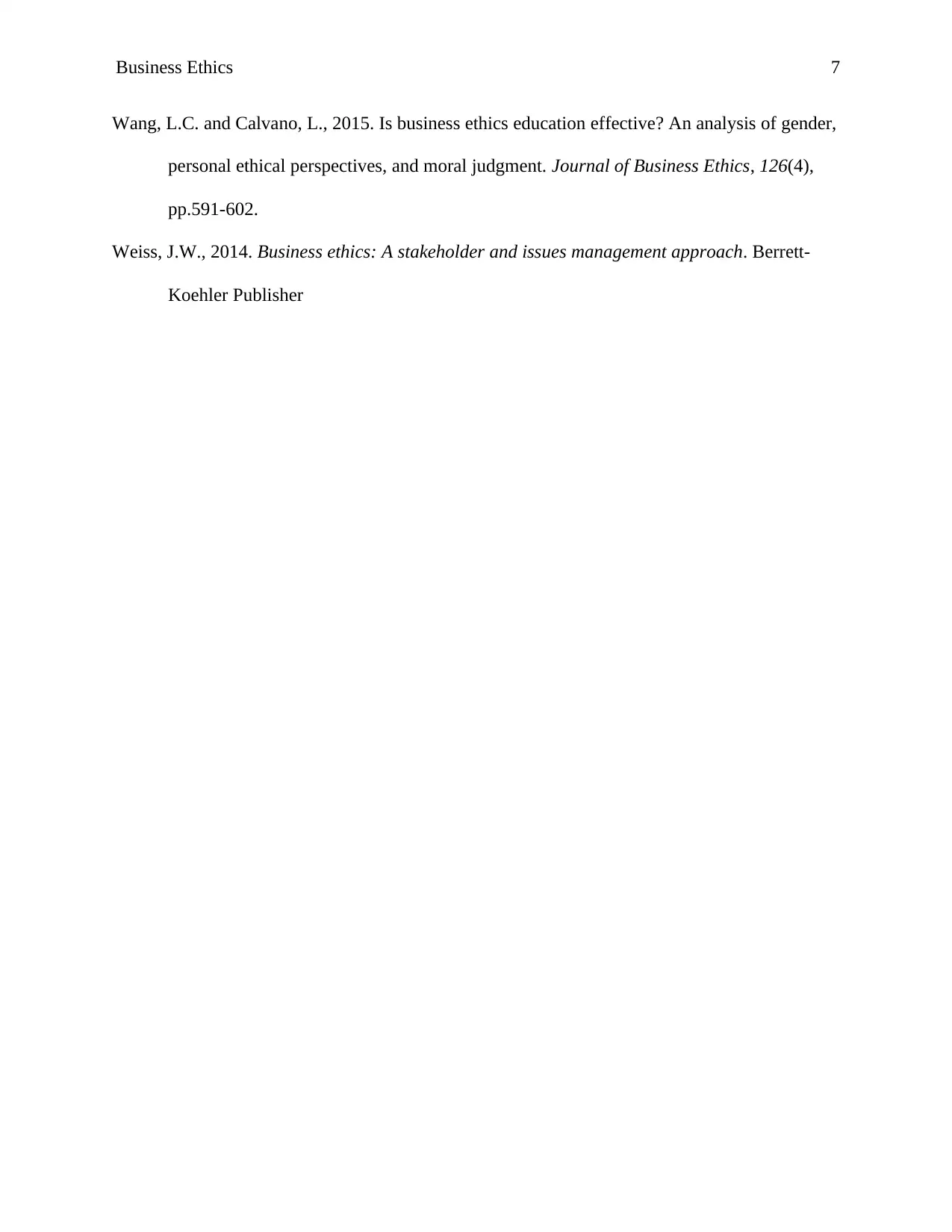
Business Ethics 7
Wang, L.C. and Calvano, L., 2015. Is business ethics education effective? An analysis of gender,
personal ethical perspectives, and moral judgment. Journal of Business Ethics, 126(4),
pp.591-602.
Weiss, J.W., 2014. Business ethics: A stakeholder and issues management approach. Berrett-
Koehler Publisher
Wang, L.C. and Calvano, L., 2015. Is business ethics education effective? An analysis of gender,
personal ethical perspectives, and moral judgment. Journal of Business Ethics, 126(4),
pp.591-602.
Weiss, J.W., 2014. Business ethics: A stakeholder and issues management approach. Berrett-
Koehler Publisher
1 out of 7
Related Documents
Your All-in-One AI-Powered Toolkit for Academic Success.
+13062052269
info@desklib.com
Available 24*7 on WhatsApp / Email
![[object Object]](/_next/static/media/star-bottom.7253800d.svg)
Unlock your academic potential
Copyright © 2020–2026 A2Z Services. All Rights Reserved. Developed and managed by ZUCOL.





